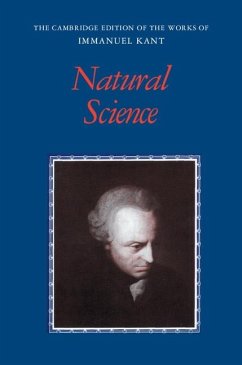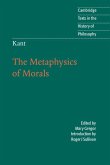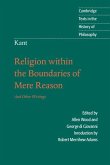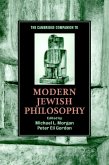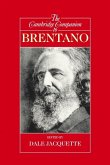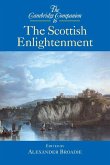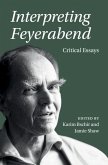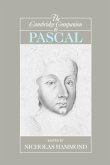Kant: Natural Science (eBook, ePUB)


Alle Infos zum eBook verschenken

Kant: Natural Science (eBook, ePUB)
- Format: ePub
- Merkliste
- Auf die Merkliste
- Bewerten Bewerten
- Teilen
- Produkt teilen
- Produkterinnerung
- Produkterinnerung

Hier können Sie sich einloggen

Bitte loggen Sie sich zunächst in Ihr Kundenkonto ein oder registrieren Sie sich bei bücher.de, um das eBook-Abo tolino select nutzen zu können.
Though Kant is best known for his strictly philosophical works in the 1780s, many of his early publications in particular were devoted to what we would call 'natural science'. Kant's Universal Natural History and Theory of the Heavens (1755) made a significant advance in cosmology, and he was also instrumental in establishing the newly emerging discipline of physical geography, lecturing on it for almost his entire career. In this volume Eric Watkins brings together new English translations of Kant's first publication, Thoughts on the True Estimation of Living Forces (1746-9), the entirety of…mehr
- Geräte: eReader
- mit Kopierschutz
- eBook Hilfe
- Größe: 2.65MB
- FamilySharing(5)
![Kant: The Metaphysics of Morals (eBook, ePUB) Kant: The Metaphysics of Morals (eBook, ePUB)]() Immanuel KantKant: The Metaphysics of Morals (eBook, ePUB)15,95 €
Immanuel KantKant: The Metaphysics of Morals (eBook, ePUB)15,95 €![Kant: Religion within the Boundaries of Mere Reason (eBook, ePUB) Kant: Religion within the Boundaries of Mere Reason (eBook, ePUB)]() Immanuel KantKant: Religion within the Boundaries of Mere Reason (eBook, ePUB)18,95 €
Immanuel KantKant: Religion within the Boundaries of Mere Reason (eBook, ePUB)18,95 €![Cambridge Companion to Modern Jewish Philosophy (eBook, ePUB) Cambridge Companion to Modern Jewish Philosophy (eBook, ePUB)]() Cambridge Companion to Modern Jewish Philosophy (eBook, ePUB)22,95 €
Cambridge Companion to Modern Jewish Philosophy (eBook, ePUB)22,95 €![Cambridge Companion to Brentano (eBook, ePUB) Cambridge Companion to Brentano (eBook, ePUB)]() Cambridge Companion to Brentano (eBook, ePUB)21,95 €
Cambridge Companion to Brentano (eBook, ePUB)21,95 €![Cambridge Companion to the Scottish Enlightenment (eBook, ePUB) Cambridge Companion to the Scottish Enlightenment (eBook, ePUB)]() Cambridge Companion to the Scottish Enlightenment (eBook, ePUB)21,95 €
Cambridge Companion to the Scottish Enlightenment (eBook, ePUB)21,95 €![Interpreting Feyerabend (eBook, ePUB) Interpreting Feyerabend (eBook, ePUB)]() Interpreting Feyerabend (eBook, ePUB)58,95 €
Interpreting Feyerabend (eBook, ePUB)58,95 €![Cambridge Companion to Pascal (eBook, ePUB) Cambridge Companion to Pascal (eBook, ePUB)]() Cambridge Companion to Pascal (eBook, ePUB)20,95 €
Cambridge Companion to Pascal (eBook, ePUB)20,95 €-
-
-
Dieser Download kann aus rechtlichen Gründen nur mit Rechnungsadresse in A, B, BG, CY, CZ, D, DK, EW, E, FIN, F, GR, HR, H, IRL, I, LT, L, LR, M, NL, PL, P, R, S, SLO, SK ausgeliefert werden.
- Produktdetails
- Verlag: Cambridge University Press
- Erscheinungstermin: 4. Oktober 2012
- Englisch
- ISBN-13: 9781107356986
- Artikelnr.: 39118786
- Verlag: Cambridge University Press
- Erscheinungstermin: 4. Oktober 2012
- Englisch
- ISBN-13: 9781107356986
- Artikelnr.: 39118786
- Herstellerkennzeichnung Die Herstellerinformationen sind derzeit nicht verfügbar.
demonstrations that Leibniz and other scholars of mechanics have made use
of in this controversial subject, together with some prefatory
considerations pertaining to the force of bodies in general (1746-9)
Translated by Jeffrey B. Edwards and Martin Schönfeld; 2. Examination of
the question whether the rotation of the Earth on its axis by which it
brings about the alternation of day and night has undergone any change
since its origin and how one can be certain of this, which [question] was
set by the Royal Academy of Sciences in Berlin as the prize question for
the current year (1754) Translated by Olaf Reinhardt; 3. The question,
whether the Earth is ageing, considered from a physical point of view
(1754) Translated by Olaf Reinhardt; 4. Universal natural history and
theory of the heavens or essay on the constitution and the mechanical
origin of the whole universe according to Newtonian principles (1755)
Translated by Olaf Reinhardt; 5. Succinct exposition of some meditations on
fire (1755) Translated by Lewis White Beck; 6. On the causes of earthquakes
on the occasion of the calamity that befell the western countries of Europe
towards the end of last year (1756) Translated by Olaf Reinhardt; 7.
History and natural description of the most noteworthy occurrences of the
earthquake that struck a large part of the Earth at the end of the year
1755 (1756) Translated by Olaf Reinhardt; 8. Continued observations on the
earthquakes that have been experienced for some time (1756) Translated by
Olaf Reinhardt; 9. New notes to explain the theory of the winds, in which,
at the same time, he invites attendance at his lectures (1756) Translated
by Olaf Reinhardt; 10. Plan and announcement of a series of lectures on
physical geography with an appendix containing a brief consideration of the
question: whether the West winds in our regions are moist because they
travel over a great sea (1757) Translated by Olaf Reinhardt; 11. New
doctrine of motion and rest and the conclusions associated with it in the
fundamental principles of natural science while at the same time his
lectures for this half-year are announced (1758) Translated by Olaf
Reinhardt; 12. Review of Silberschlag's work: theory of the fireball that
appeared on 23 July 1762 (1764) Translated by Eric Watkins; 13. Notice of
Lambert's correspondence (1782) Translated by Eric Watkins; 14. On the
volcanoes on the Moon (1785) Translated by Olaf Reinhardt; 15. Something
concerning the influence of the Moon on the weather (1794) Translated by
Olaf Reinhardt; 16. Physical geography (1802).
demonstrations that Leibniz and other scholars of mechanics have made use
of in this controversial subject, together with some prefatory
considerations pertaining to the force of bodies in general (1746-9)
Translated by Jeffrey B. Edwards and Martin Schönfeld; 2. Examination of
the question whether the rotation of the Earth on its axis by which it
brings about the alternation of day and night has undergone any change
since its origin and how one can be certain of this, which [question] was
set by the Royal Academy of Sciences in Berlin as the prize question for
the current year (1754) Translated by Olaf Reinhardt; 3. The question,
whether the Earth is ageing, considered from a physical point of view
(1754) Translated by Olaf Reinhardt; 4. Universal natural history and
theory of the heavens or essay on the constitution and the mechanical
origin of the whole universe according to Newtonian principles (1755)
Translated by Olaf Reinhardt; 5. Succinct exposition of some meditations on
fire (1755) Translated by Lewis White Beck; 6. On the causes of earthquakes
on the occasion of the calamity that befell the western countries of Europe
towards the end of last year (1756) Translated by Olaf Reinhardt; 7.
History and natural description of the most noteworthy occurrences of the
earthquake that struck a large part of the Earth at the end of the year
1755 (1756) Translated by Olaf Reinhardt; 8. Continued observations on the
earthquakes that have been experienced for some time (1756) Translated by
Olaf Reinhardt; 9. New notes to explain the theory of the winds, in which,
at the same time, he invites attendance at his lectures (1756) Translated
by Olaf Reinhardt; 10. Plan and announcement of a series of lectures on
physical geography with an appendix containing a brief consideration of the
question: whether the West winds in our regions are moist because they
travel over a great sea (1757) Translated by Olaf Reinhardt; 11. New
doctrine of motion and rest and the conclusions associated with it in the
fundamental principles of natural science while at the same time his
lectures for this half-year are announced (1758) Translated by Olaf
Reinhardt; 12. Review of Silberschlag's work: theory of the fireball that
appeared on 23 July 1762 (1764) Translated by Eric Watkins; 13. Notice of
Lambert's correspondence (1782) Translated by Eric Watkins; 14. On the
volcanoes on the Moon (1785) Translated by Olaf Reinhardt; 15. Something
concerning the influence of the Moon on the weather (1794) Translated by
Olaf Reinhardt; 16. Physical geography (1802).
